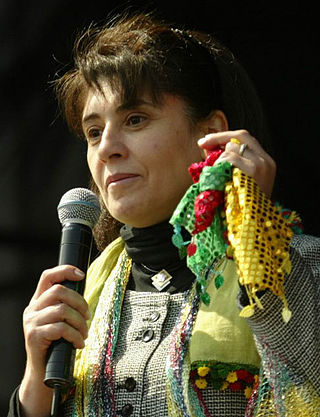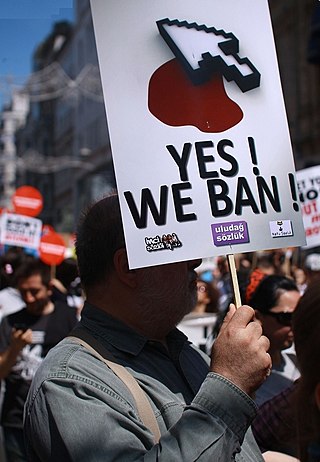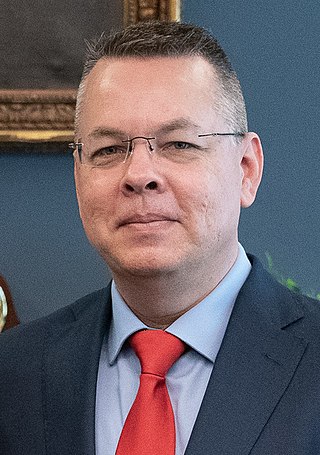Related Research Articles
The Republic of Turkey was created after the overthrow of Sultan Mehmet VI Vahdettin by the new Republican Parliament in 1922. This new regime delivered the coup de grâce to the Ottoman state which had been practically wiped away from the world stage following the First World War.

Recep Tayyip Erdoğan is a Turkish politician serving as the 12th and current president of Turkey since 2014. He previously served as prime minister of Turkey from 2003 to 2014 and as mayor of Istanbul from 1994 to 1998. He founded the Justice and Development Party (AKP) in 2001, leading it to election victories in 2002, 2007, and 2011 general elections before being required to stand down upon his election as president in 2014. He later returned to the AKP leadership in 2017 following the constitutional referendum that year. Coming from an Islamist political background and self-describing as a conservative democrat, he has promoted socially conservative and populist policies during his administration.

Leyla Zana is a Kurdish politician from Kurdish descent. She was imprisoned for ten years for her political activism, which was deemed by the Turkish courts to be against the unity of the country. She was awarded the 1995 Sakharov Prize by the European Parliament but was unable to collect it until her release in 2004. She was also awarded the Rafto Prize in 1994 after being recognized by the Rafto Foundation for being incarcerated for her peaceful struggle for the human rights of the Kurdish people in Turkey and the neighbouring countries.

The multi-party period of the Republic of Turkey started with the establishment of the opposition Liberal Republican Party by Ali Fethi Okyar in 1930 after President Mustafa Kemal Atatürk asked Okyar to establish the party as part of an attempted transition to multi-party democracy in Turkey. It was soon closed by the Republican People's Party government, however, when Atatürk found the party to be too influenced by Islamist-rooted reactionary elements.

Censorship in Turkey is regulated by domestic and international legislation, the latter taking precedence over domestic law, according to Article 90 of the Constitution of Turkey.

The Solution process, also known as Peace process or the PKK–Turkish peace process, was a peace process that aimed to resolve the conflict between the Turkey and PKK as part of the Kurdish–Turkish conflict (1978–present). The conflict has been ongoing since 1984 and resulted in some 40,000 mortal casualties and great economic losses for Turkey as well as high damage to the general population.
On 15 July 2016, a faction within the Turkish Armed Forces, organized as the Peace at Home Council, attempted a coup d'état against state institutions, including the government and president Recep Tayyip Erdoğan. They attempted to seize control of several places in Ankara, Istanbul, Marmaris and elsewhere, such as the Asian side entrance of the Bosphorus Bridge, but failed to do so after forces loyal to the state defeated them. The Council cited an erosion of secularism, elimination of democratic rule, disregard for human rights, and Turkey's loss of credibility in the international arena as reasons for the coup. The government said the coup leaders were linked to the Gülen movement, which is designated as a terrorist organization by the Republic of Turkey and led by Fethullah Gülen, a Turkish businessman and scholar who lives in Pennsylvania. The Turkish government alleged that Gülen was behind the coup and that the United States was harboring him. Events surrounding the coup attempt and the purges in its aftermath reflect a complex power struggle between Islamist elites in Turkey.
The 2016–present purges in Turkey are a series of purges by the Government of Turkey enabled by a state of emergency in reaction to the 15 July failed coup d'état. The purges began with the arrest of Turkish Armed Forces personnel reportedly linked to the coup attempt but arrests were expanded to include other elements of the Turkish military, as well as civil servants and private citizens. These later actions reflected a power struggle between secularist and Islamist political elites in Turkey, affected people who were not active in nor aware of the coup, but who the government claimed were connected with the Gülen movement, an opposition group which the government blamed for the coup. Possession of books authored by Gülen was considered valid evidence of such a connection and cause for arrest.

On the evening of 10 December 2016, two explosions caused by a car bombing and suicide bombing in Istanbul's Beşiktaş municipality killed 48 people and injured 166 others. 39 of those killed were police officers, 7 were civilians and 2 were perpetrators. The Kurdistan Freedom Hawks (TAK) assumed responsibility, claiming that their members killed more than 100 police officers.

Erol Önderoğlu is a Turkish-French journalist, and a representative of Reporters Without Borders. In 2016, he was arrested by the Turkish government for his work supporting Ozgur Gundem, a Kurdish newspaper, and accused of supporting terrorists; his arrest was widely criticized as suppression of freedom of the press.

Andrew Craig Brunson is an American pastor and a teaching elder of the Evangelical Presbyterian Church. Brunson was an evangelical pastor of the Izmir Resurrection Church, a small Protestant church with about 24 congregants. German news service T-Online describes the church as having been held in a room in a tenement. Brunson was arrested in October 2016 in Turkey, where he had lived since the mid-1990s, for being associated with the Gülenist Terror Group (FETÖ) and the PKK as well as espionage, during the purges following the 2016 Turkish coup d'état attempt against the democratically elected government of Recep Tayyip Erdoğan. In 2019, Brunson published a memoir about his ordeal.

The March for Justice was a 450 km (280-mile) march from Ankara to Istanbul to protest against arrests that were made as part of the government crackdown following the July 2016 coup d'état attempt. After the coup attempt, the ruling Justice and Development Party (AKP) government declared a state of emergency. Since then at least 50,000 people have been arrested and another 140,000 people have been removed from their positions. The protest was led by opposition leader Kemal Kılıçdaroğlu, in response to a lengthy prison sentence that Enis Berberoğlu received for allegedly giving the press a video that shows Turkish intelligence smuggling weapons into Syria. The march concluded in Istanbul on 9 July with a rally attended by hundreds of thousands of people, during which Kılıçdaroğlu spoke at length about the effect that the government purge has had on the judiciary and rule of law in Turkey.

Operation Olive Branch was a cross-border military operation conducted by the Turkish Armed Forces and Syrian National Army (SNA) in the majority-Kurdish Afrin District of northwest Syria, against the People's Protection Units (YPG) of the Syrian Democratic Forces (SDF). The air war and use of major artillery ended as the Arab and Turkmen militias of the SNA entered the city of Afrin on 18 March 2018, and the SDF insurgency in Northern Aleppo began.
The presidency of Recep Tayyip Erdoğan began when Recep Tayyip Erdoğan took the oath of office on 28 August 2014 and became the 12th president of Turkey. He administered the new Prime Minister Ahmet Davutoğlu's oath on 29 August. When asked about his lower-than-expected 51.79% share of the vote, he allegedly responded, "there were even those who did not like the Prophet. I, however, won 52%." Assuming the role of President, Erdoğan was criticized for openly stating that he would not maintain the tradition of presidential neutrality. Erdoğan has also stated his intention to pursue a more active role as President, such as utilising the President's rarely used cabinet-calling powers. The political opposition has argued that Erdoğan will continue to pursue his own political agenda, controlling the government, while his new Prime Minister Ahmet Davutoğlu would be docile and submissive. Furthermore, the domination of loyal Erdoğan supporters in Davutoğlu's cabinet fuelled speculation that Erdoğan intended to exercise substantial control over the government.
Tuna Altınel is a Turkish mathematician, born February 12, 1966 in Istanbul, who has worked at the University Lyon 1 in France since 1996. He is a specialist in group theory and mathematical logic. With Alexandre Borovik and Gregory Cherlin, he proved a major case of the Cherlin–Zilber conjecture.
Besê Hozat is a leader in the Kurdistan Workers' Party and is the co-chair of the Kurdistan Communities Union alongside Cemil Bayik. She is the sixth member of the General Presidential Council, the most authoritative body in the PKK.
On August 12, 2015, Prime Minister of Turkey Recep Tayyip Erdoğan delivered a speech on the subject of the Kurdish issue in Diyarbakır, the largest Kurdish-majority city in Turkey. The speech is characterized by being the most liberal discourse ever at the time conducted by a Turkish head of government on this issue. In the speech, the prime minister conceded that the Turkish state had made mistakes in the past, used the term “the Kurdish question” and vowed to settle it through more democracy, more citizenship law, and more prosperity. The speech was considered "historic" and "groundbreaking" in Turkey. The speech also faced heavy criticism by Turkish commentators and the main opposition party CHP, for putting the unity of Turkey in danger.

Şebnem Korur Fincancı is a Turkish medic, former professor, and current president of the Turkish Medical Association (TBB). She is an internationally renowned expert on human rights and a member of the Turkish Human Rights Association (TİHV).

A terrorist attack occurred on İstiklal Avenue in the Beyoğlu district of Istanbul, Turkey, on 13 November 2022, killing 6 people and injuring 81 others.
References
- 1 2 3 4 5 Lowen, Mark (13 April 2017). "Erdogan's Turkey". BBC News . Retrieved 24 April 2017.
- 1 2 Von Amory, Burchard (17 February 2017). "Warum Erdogan die Universitäten schleift". Der Tagesspiegel (in German). Retrieved 25 April 2017.
- 1 2 3 "Academic voices her fears for Turkey ahead of referendum". BBC News. 13 April 2017. Retrieved 24 April 2017.
- 1 2 3 "Nöropsikoloji Üzerine Prof. Dr. Öget Öktem İle Söyleşi". 28 October 2016. Retrieved 6 June 2017.
- 1 2 3 4 Arslan, Rengin (13 February 2017). "Turkey academics speak of fear and loss amid mass sackings". BBC News. Retrieved 24 April 2017.
- ↑ "Ji têkoşîna akademî û jiyana Oget Oktem Tanor şop". Sujin Gazete. 11 February 2017. Retrieved 25 April 2017.
- 1 2 "Türkiye'nin ilk nöropsikoloğu Öget Öktem Tanör yeni KHK ile ihraç edildi". Karar. 8 February 2017. Retrieved 5 June 2017.